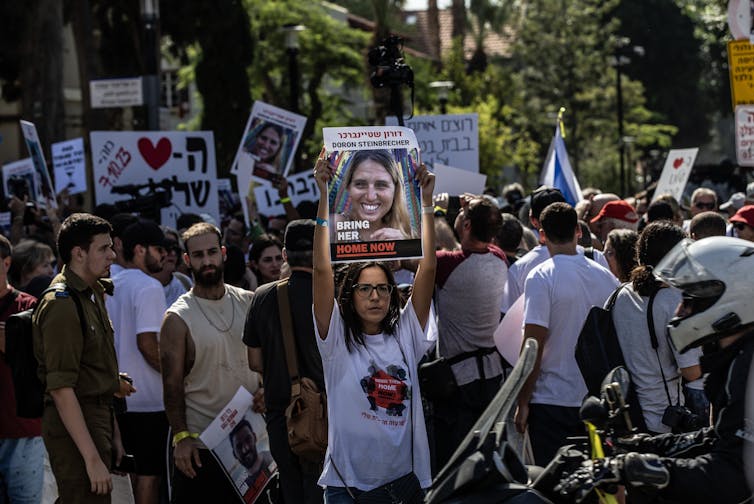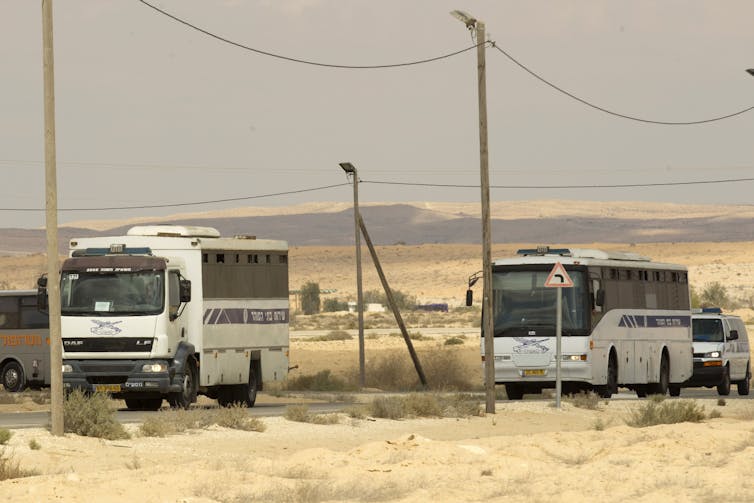
Hamas took more than 200 people hostage during its deadly rampage in Israeli border towns on Oct. 7, 2023. Among the hostages are children and the elderly. While four of them have been released, the fate of the rest is unknown, as Qatar serves as an intermediary in working to free the hostages. In this interview with Naomi Schalit, The Conversation U.S. senior politics and democracy editor, Gregory F. Treverton of USC Dornsife, a former chairman of the National Intelligence Council in the Obama administration, says most hostage-taking has specific goals. This one, says Treverton, “is basically an adjunct of warfare, and that makes it very different” – and very hard to solve.
How do people in your field think about hostage-taking? I would imagine that the feeling is, “Oh, my god, please let nothing like that happen.”
It’s an utter dilemma, because on the one hand you feel for the hostages. And as we’ve seen in the past, the Israelis have been prepared to – and did – release a thousand hostages to get one Israeli back.
On the other hand, when you do a deal to get hostages released, you’re only encouraging more hostage-taking. So you’re damned if you do and damned if you don’t. As a result, every government, including the United States, says, “We never deal with hostage-takers.” But of course, they all do – and they have to.
I think it’s one of the hardest parts of being in the national security business. You want to free the people – but you’re also going to get criticized. Every time President Biden has gotten somebody out of Russia, people have said, “Oh, he’s paid too high a price” or “He’s rewarded hostage-taking,” and to some extent, that’s true. You are basically rewarding the hostage-takers. But we still have to deal with them. We want to get our people out. And at some some point – as the Israelis have shown – they’re prepared to pay almost any price to get them back.

Israel released more than 1,000 prisoners in 2011 in exchange for Israeli soldier Gilad Shalit, whom Hamas captured and held for five years. This is more than 200 times the number of hostages, so how do you even think about that?
At least in my professional experience, this is without precedent. The closest parallel would be the 1976 Entebbe hijacking and hostage-taking by two Germans and two Palestinians on a flight from Tel Aviv to Paris. Hijackers held 103 Israeli hostages, once they released the 148 non-Israeli hostages. Hamas holds twice the number of hostages, and in very, very different circumstances. In Entebbe, the Israeli government knew where they were, they were in a single place – the airplane – which had been forced to land in Entebbe, Uganda, after taking off from Tel Aviv. And that’s where Israeli commandos were able to rescue the hostages.
In Gaza, we don’t know where they are. We know for sure they’re scattered throughout the tunnels, likely in lots of different small groups. Hamas will presumably then use them as shields if fighting begins on the ground. They might think that that would encourage the Israelis not to make a major attack – to keep Hamas from killing all the hostages. We know that Israeli Prime Minister Benjamin Netanyahu isn’t keen on a major ground assault, and this really puts the onus on the Israelis for how the hostage situation ends.
When you think about the history of hostage negotiations, do you see something that has any relevance to what’s going on now?
It seems to me it’s a really different category. Even Entebbe was hostage-taking for some political aim – the hijackers wanted Israel to release a large number of prisoners who were Palestinian. A colleague of mine used to say that the point of terrorism was to do the least amount of violence with the most people watching it. But Entebbe was political theater, basically, and this is not political theater. This is basically an adjunct of warfare, and that makes it very different. It’s not the usual kind of tit for tat, with “How much am I willing to pay?” or “Can I take a hostage to get somebody else out?”

What does Israel’s heavy bombing of Gaza and the beginning of a ground invasion tell you about the government’s approach to the hostage situation?
It suggests either that they have a pretty good fix on where the hostages are located, which seems unlikely given the network of Hamas tunnels, or that they have decided they must proceed in any case and will try their best to safeguard and free hostages as they go. Given the Hamas practice of using civilians as human shields, the outcome is likely to be very ugly.
Where do you see this going?
I see no happy ending. I don’t think there’s a deal that Israel could conceivably make, given its own politics. Or that Hamas would accept. So it does seem to me that at some point there is going to be that ground attack and the hostages are going to be caught in the middle of it. I see almost no alternative, given what Israel has pledged – to destroy Hamas. The Biden administration maintains that Israel doesn’t really have a strategy. They have a desire, which is to destroy Hamas. But that’s not a strategy for dealing with the hostages or for Gaza after the attack.
Gregory F. Treverton, Professor of Practice in International Relations, USC Dornsife College of Letters, Arts and Sciences
This article is republished from The Conversation under a Creative Commons license.
